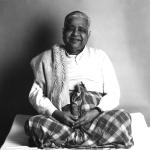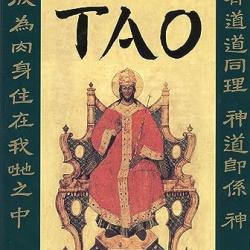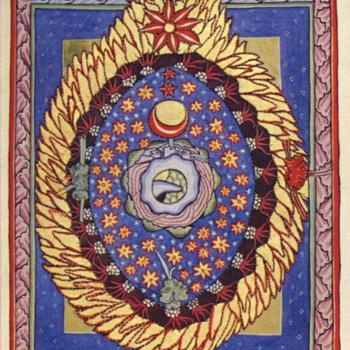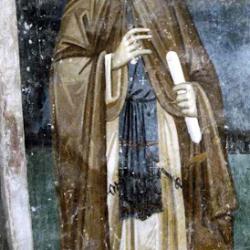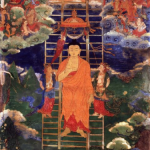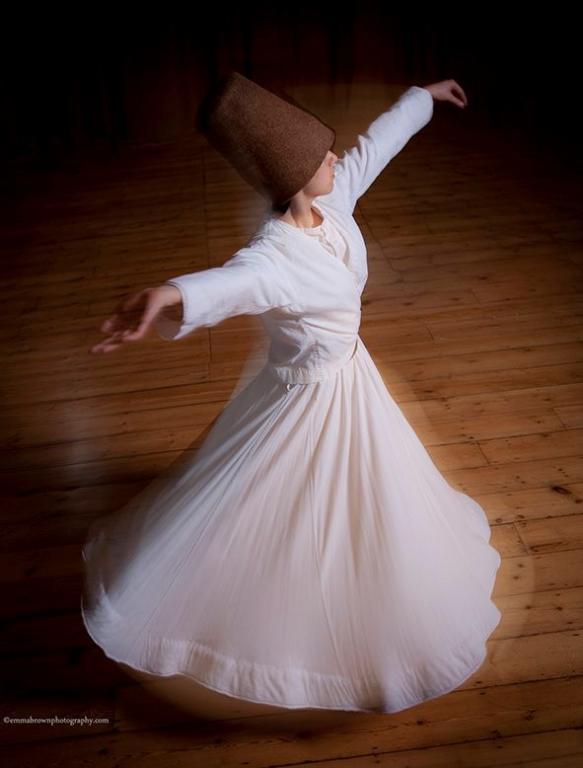
EmmaBrownPhotography.com
Jalaladin Muhammad Balkhi, the wondrous Jalaladin Rumi was born on this day, the 30th of September, in 1207.
I write about him every once in a while. Here, for instance, I devoted a whole dharma talk to him.
In 2007 he got a lot of press as “America’s most beloved poet.” And you know, he probably still is.
Rumi was a Muslim theologian, sometimes these days people slide over this fact while celebrating that other truth of him as a nondual mystic. The Mevlevi Sufi Order, the so-called Whirling Dervishes, was founded by his son as a way to convey Rumi’s mystical teachings over the generations. With some success, I feel.
He was and remains super, super important to many, including me.
Among the many, many interesting things about him is the at least apparently homoerotic subtext to his mystical writings. His teacher was the controversial wandering mystic Shams Tabrizi.
It was this encounter, as intimate as intimate can be, that opened Rumi’s heart. Tabriz was disreputable, totally outside the bounds of the society that Rumi was a pillar of. This intimacy, whatever the best word for it is, centered Rumi opening to a madzub. The universalist Sufi master Inayat Khan describes the madzub:
“The fifth form in which a person who lives the inner life appears is a strange form, a form which very few people can understand. He puts on the mask of innocence outwardly to such an extent that those who do not understand may easily consider him unbalanced, peculiar, or strange. He does not mind about it, for the reason that it is only his shield. If he were to admit before humanity the power that he has, thousands of people would go after him, and he would not have one moment to live his inner life.
“The enormous power that he possesses governs inwardly lands and countries, controlling them and keeping them safe from disasters such as floods and plagues, and also wars; keeping harmony in the country or in the place in which he lives; and all this is done by his silence, by his constant realization of the inner life. To a person who lacks deep insight he will seem a strange being.
“In the language of the East he is called Madzub. That same idea was known to the ancient Greeks and traces of it are still in existence in some places, but mostly in the East. There are souls to be found today in the East, living in this garb of a self-realized man who shows no trace outwardly of philosophy or mysticism or religion, or any particular morals; and yet his presence is a battery of power, his glance most inspiring, there is a commanding expression in his looks; and if he ever speaks, his word is the promise of God. What he says is truth; but he rarely speaks a word, it is difficult to get a word out of him; but once he has spoken, what he says is done.”
Whatever else, a madzub is a transgresive person, a part of the mystical current that in general is a problem for the religious. That the scholar Rumi was so entranced and so devoted that one can see an erotic side to it, well, that was a problem then. And, it continues to be a problem for some to this day.
Here something outside boundaries was burning. Is burning.
For me as a person on the Zen way, another of his challenging gifts is that he encounters the nondual in a totally personal way. For him the intimated the place where self and other are burned away, is an expression of love. The nondual as love, lover, and beloved.
So different. And yet, not different at all.
Rumi’s most popular presenter in North America Coleman Barks has been dragged over the coals for not in fact knowing Persian. Similarly, and I’m stretching for the right word, as there has never been anything hidden about these facts, allegations, revelations, whatever, have been made regarding Stephen Mitchell’s famous version of the Tao Te Ching.
In both cases poets of some skill, and with their own insight into the intimate, steeped in mystical traditions if not their languages, have taken literal translations and given us lovely and compelling versions of remarkable writings.
In Barks case, he has generally enjoyed more gratitude for his work than criticism, even receiving an honorary doctorate from the University of Tehran. And, absolutely, those who do fall in love with Rumi (or the Tao Te Ching), should go on to other translators, which will cast additional shades of a larger understanding…
However we’re introduced to him, Rumi shines through as an amazing personality, as a pointer of the way into the paths of heart. And, definitely should be counted among the pantheon of the world’s spiritual guides.
Which brings me in conclusion to his poem the Guest House. It is a perennial favorite of Insight and Zen practitioners as it captures much of the heart of the practices of intimacy. I love it.
I shared these a few months back, but as a small birthday present, here they are again. Three versions of the poem. One is a full on scholarly and frankly dry translation. The other two more creative efforts at capturing the heart of the matter.
Each worth a read.
All worth reading one after the other…
***
So. First, here’s a translation of the text by the scholar Reynold Nicholson, from his Mathnawi of Jalalu’ddin Rumi, published by “The Trustees of E.J.W. Gibb Memorial” by Luzac, 1977:
This body, O youth, is a guest-house: every morning a new
guest comes running (into it).
Beware, do not say, “The (guest) is a burden to me,” for
presently he will fly back into non-existence.
Whatsoever comes into thy heart from the invisible world is
thy guest: entertain it well!
Every day, too, at every moment a (different) thought comes,
like an honoured guest, into thy bosom.
O (dear) soul, regard thought as a person, since (every) person
derives his worth from thought and spirit.
If the thought of sorrow is waylaying (spoiling) joy, (yet) it
is making preparations for joy.
It violently sweeps thy house clear of (all) else, in order that
new joy from the source of good may enter in.
It scatters the yellow leaves from the bough of the heart, in
order that incessant green leaves may grow.
It uproots the old joy, in order the new delight may march
in from the Beyond.
Sorrow pulls up the crooked rotten (root), in order that it may
disclose the root that is veiled from sight.
Whatsoever (things) sorrow may cause to be shed from the
heart or may take away (from it), assuredly it will bring better
in exchange.
(Whenever) the thought (of sorrow) comes into thy breast
anew, go to meet it with smiles and laughter.
***
As I’ve said Rumi’s most popular presenter in North America is Coleman Barks.
Barks has a profound spiritual eye, and his versions of the texts take on a life of their own. Often sort of collaborations between Rumi and Barks. With that, here’s Barks’ version of the Guest House, first published in Rumi: Selected Poems, Penguin Books, 2004:
This being human is a guest house.
Every morning a new arrival.
A joy, a depression, a meanness,
some momentary awareness comes
as an unexpected visitor.
Welcome and entertain them all!
Even if they’re a crowd of sorrows,
who violently sweep your house
empty of its furniture,
still, treat each guest honorably.
He may be clearing you out
for some new delight.
The dark thought, the shame, the malice,
meet them at the door laughing,
and invite them in.
Be grateful for whoever comes,
because each has been sent
as a guide from beyond.
***
Finally. Kabir Helminski is a Western born Sufi Shaikh in the Mevlevi Order. His version of the Guest House, first published in the Rumi Collection, Threshold Books, 1998:
Darling, the body is a guest house;
every morning someone new arrives.
Don’t say, “O, another weight around my neck!”
or your guest will fly back to nothingness.
Whatever enters your heart is a guest
from the invisible world: entertain it well.
Every day, and every moment, a thought comes
like an honored guest into your heart.
My soul, regard each thought as a person,
for every person’s value is in the thought they hold.
If a sorrowful thought stands in the way,
it is also preparing the way for joy.
It furiously sweeps your house clean,
in order that some new joy may appear from the Source.
It scatters the withered leaves from the bough of the heart,
in order that fresh green leaves might grow.
It uproots the old joy so that
a new joy may enter from Beyond.
Sorrow pulls up the rotten root
that was veiled from sight.
Whatever sorrow takes away or causes the heart to shed,
it puts something better in its place-
especially for one who is certain
that sorrow is the servant of the intuitive.
Without the frown of clouds and lightning,
the vines would be burned by the smiling sun.
Both good and bad luck become guests in your heart:
like planets traveling from sign to sign.
When something transits your sign, adapt yourself,
and be as harmonious as its ruling sign,
so that when it rejoins the Moon,
it will speak kindly to the Lord of the heart.
Whenever sorrow comes again,
meet it with smiles and laughter,
saying, “O my Creator, save me from its harm,
and do not deprive me of its good.
Lord, remind me to be thankful,
let me feel no regret if its benefit passes away.”
And if the pearl is not in sorrow’s hand,
let it go and still be pleased.
Increase your sweet practice.
Your practice will benefit you at another time;
someday your need will be suddenly fulfilled.
***
***
Image of a whirling dervish by Emma Brown Photography


